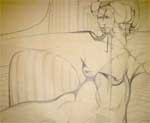Orthorexia Nervosa
 Orthorexia nervosa (also spelled “orthoexia”) is a term coined by physician Steven Bratman in an article he wrote for Yoga Journal in 1997. It is not a traditionally recognized eating disorder but it does share some characteristics with both anorexia nervosa and bulimia, most specifically obsession with food. However, orthorexia nervosa refers to a fixation on eating “pure” or “right” or “proper” food rather than on the quantity of food consumed.
Orthorexia nervosa (also spelled “orthoexia”) is a term coined by physician Steven Bratman in an article he wrote for Yoga Journal in 1997. It is not a traditionally recognized eating disorder but it does share some characteristics with both anorexia nervosa and bulimia, most specifically obsession with food. However, orthorexia nervosa refers to a fixation on eating “pure” or “right” or “proper” food rather than on the quantity of food consumed.
Orthorexia Nervosa has Similarities to Other Disorders
Having orthorexia nervosa is like suffering from Workaholism or Exercise Addiction in which something that is normally considered good or healthy is done in excess and to the point that a person becomes obsessed with the activity.
Like other obsessive disorders people with orthorexia experience cyclical extremes, changes in mood, and isolate themselves. Most of their life is spent planning and preparing meals and resisting temptation to the exclusion of other activities. They may even go to the extreme of avoiding certain people who do not share in their dietary beliefs or carry their own supply of food wherever they go.
Orthorexia Nervosa is Ritualistic
An interesting aspect of Orthorexia is that people who have it experience feelings of superiority about their eating discipline. Eating is a holy ritual. Bites may be chewed fifty times or more. Perhaps only fruit or raw foods are consumed. Whatever dietary regime a person ascribes to, when they fall off the wagon with a dietary transgression, which may be as slight as eating a raisin or garlic or as major as downing a pint of ice cream, they feel guilty and defiled. This often leads to acts of penance which usually manifest as a stricter diet or bouts of fasting.
Consequences and Treatment for Orthorexia Nervosa
Like other eating disorders, orthorexia may result in negative consequences. Social isolation, physical deterioration, and a failure to enjoy life can occur. There have even been a few deaths related to orthorexia when a person becomes so low in body weight due to restrictive eating or fasting that the heart fails.
When it comes to treatment for orthorexia, doctors may not be as well informed about the condition as they might be about other, more recognized and clinically defined disorders. However, eating disorder specialists are more aware of this condition and can provide treatment to those whose lives revolve around their menu.
detail from the mural ‘Anorexia Y Tabaquismo’ by Jorge Figueroa Acosta
 Eating Disorder Self Test. Take the EAT-26 self test to see if you might have eating disorder symptoms that might require professional evaluation. All answers are confidential.
Eating Disorder Self Test. Take the EAT-26 self test to see if you might have eating disorder symptoms that might require professional evaluation. All answers are confidential.